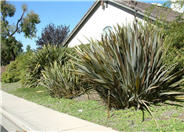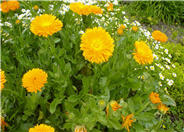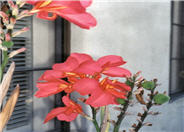
Common name:New Zealand Flax
Botanical name:Phormium tenax
New Zealand Flax is a large, bold plant with stiffly vertical, sword-like, green leaves that arise from its base. It should be grown under full sun for best color. Varieties will offer different growth habits and leaf color.

Common name:Bitsy Daylily
Botanical name:Hemerocallis 'Bitsy'
This dependable perennial has thin, strap-like, grass-like leaves reaching 12"-18" tall. Bright yellow flowers, resembling lilies, are high above the foliage, making the overall height of this plant at 24" tall. Blooms appear in spring through fall, thus making this Hemerocallis variety very popular. It needs regular watering and more during hot summer months. It prefers full sun or light shade and will tolerate seaside conditions.

Common name:Calendula, Pot Marigold
Botanical name:Calendula officinalis
This wonderful flower will grow about 1'-3' tall and has amazing dark green leaves with bright golden-yellow-orange flowers that bloom in winter, spring, and summer. It is an edible flower in organic gardens.

Common name:Common Garden Canna
Botanical name:Canna X generalis (assorted varieties)
These lilies will grow anywhere from about 2-5' tall and have large dark green or bronzy green leaves with flowers that come in a variety of beautiful colors and that bloom spring to fall.Needs protected location and extra care to survive in Las Vegas and desert regions.

Common name:Oregon Bigleaf Maple
Botanical name:Acer macrophyllum
This fast-growing deciduous tree grows to 90 feet in height with a 45' spread. It is a coastal and inland native which flourishes on north facing slopes. It has very large leaves, 6-15 in. wide, that offer spectacular yellow fall color in cool areas. It is found in streambanks and watershed canyons and should only be used in areas that are naturally moist.

Common name:Italian Cypress
Botanical name:Cupressus sempervirens
This narrow tree will grow to about 25' tall and has small, green, scaled leaves.
Photographer: GardenSoft
Incorporate compost 6" into your soil to retain water, reduce compaction, feed earthworms, and provide valuable nutrients to your plants.
Attract, or buy beneficial insects such as ladybugs and lacewings to control pest outbreaks in your garden.